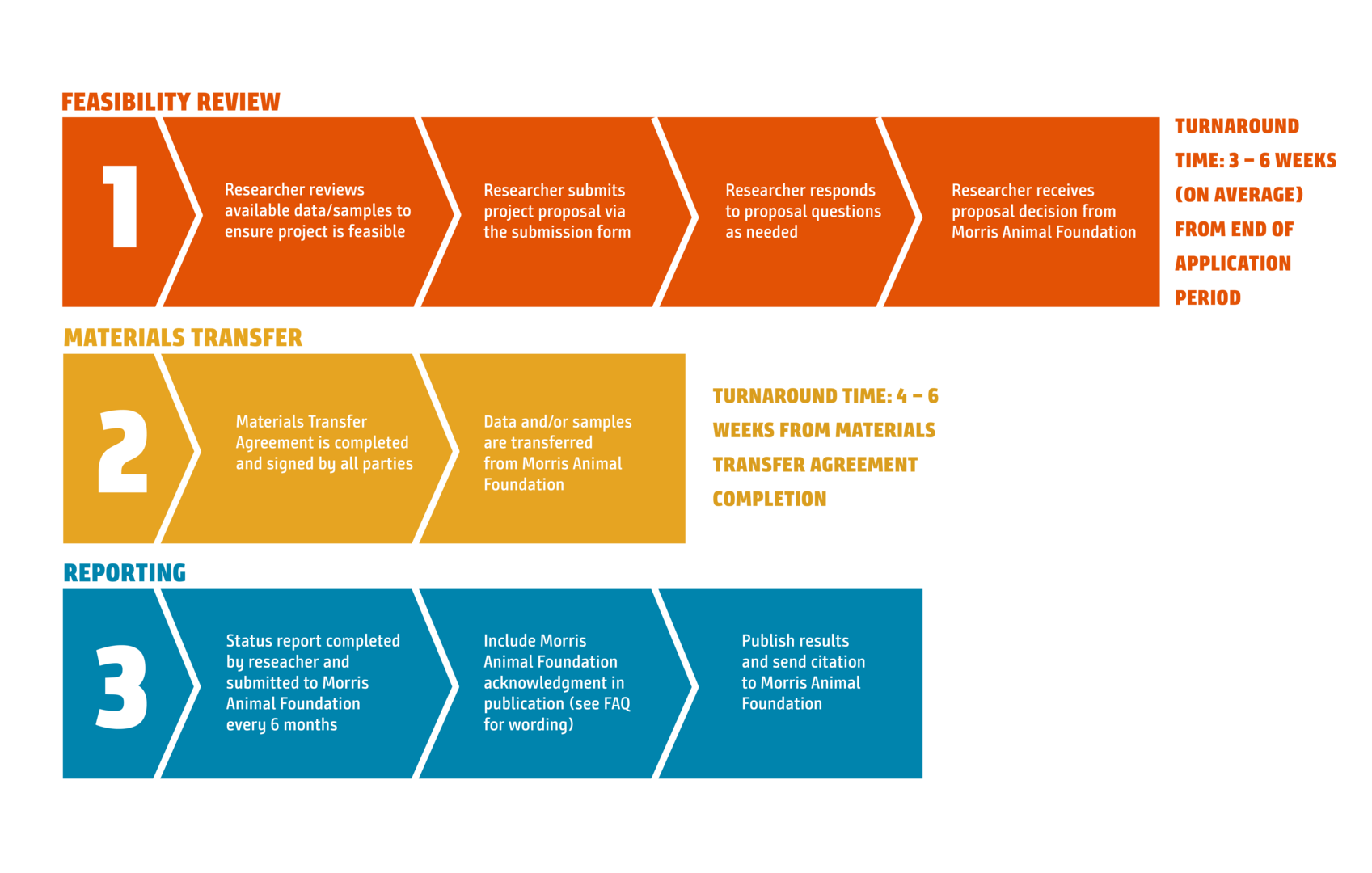| PI NAME |
AFFILIATION |
TOPIC |
| FY24 |
|
|
| Geoffrey Wood |
University of Guelph |
Early detection of splenic hemangiosarcoma in dogs using serum microRNA |
| Adam Boyko |
Cornell University |
Identifying Risks Associated With Inbreeding in Golden Retrievers |
Kevin Perez,
David Stanete, David
Alejandro Ocampo |
Epiterna |
Biomarkers of aging and mortality. Incidence of age-related diseases and factors affecting lifespan. |
Alison Hillman,
Anne Avery,
Kelly Hughes, Brenna
Swafford |
Ausvet, Colorado State University and Morris Animal Foundation |
Descriptive analysis of lymphoma occurrence in dogs enrolled in the Golden Retriever Lifetime Study |
| FY23 |
|
|
| Sarah Hooper |
Ross University School of Veterinary Medicine |
Understanding how social determinants impact Golden Retriever owner’s choice in feeding practices and exercise and how this impacts the risk of the development of neoplastic diseases |
| Rebecca Bloch |
North Carolina State University College of Veterinary Medicine |
Investigation into the risk factors and veterinary prescribing practices for canine otitis externa |
| Geoffrey Wood |
University of Guelph |
Early Detection of Lymphoma in Dogs by Circulating MicroRNA |
| Lauren Baker |
University of Wisconsin-Madison |
Epidemiologic Investigation of Acquired Urinary Incontinence in Dogs |
| David Brodbelt |
Royal Veterinary College |
VetCompass Canine Cancer Epidemiology Fellowship |
| Hille Fieten |
Utrecht University |
Genetic epidemiology of hemangiosarcoma |
Alison Hillman, Brenna
Swafford |
Ausvet and Morris Animal Foundation |
Descriptive analysis of hemangiosarcoma occurrence in dogs enrolled in the Golden Retriever Lifetime Study |
Patrice Witschen, Kelly
Hughes |
Colorado State University |
Using the PTPN11 mutation to detect canine histocytic sarcoma |
| FY22 |
|
|
| Lauren Trepanier |
University of Wisconsin-Madison |
Environmental Chemical Exposures in Golden Retrievers with Lymphoma |
| Lauren Wisnieski |
Lincoln Memorial University |
What factors are predictive of heartworm preventative medication adherence and development of heartworm disease in golden retrievers |
| Kevin Morris |
University of Denver |
Exploring the impacts of Social Determinants of Health and Human-Animal Bond on compliance and retention in Morris Animal Foundation's Golden Retriever Lifetime Study |
| Tamer Ahmed |
University of California, Davis |
Maximizing the scientific utilization of Golden Retriever Lifetime Study datasets |
Kiara Hodos, Sheryl
Magzamen |
University of California, Davis |
Association between protein content in dry dog food and aggression in golden retriever dogs |
Gina Davis, Melissa
Bain |
Colorado State University |
Disease prevalence in the Golden Retriever Lifetime Study |
Julia Labadie, Brenna
Swafford |
Morris Animal Foundation |
Cohort profile: the Golden Retriever Lifetime Study |
| FY21 |
|
|
| Ross Luetchke |
University of Wisconsin-Madison |
Environmental exposures and lymphoma risk: a nested case–control study using the Golden Retriever Lifetime Study cohort |
| Joseph Bartges |
University of Georgia |
Description of Golden Retriever Lifetime Study Data Processing for AGE Research Project with Golden Retriever Lifetime Study Serum and Urine Samples |
| Sangeeta Rao |
Colorado State University |
Identifying the preferred choices of antimicrobials by veterinarians for various infectious diseases |
| Kaitlin Sawatzki |
Tufts University |
Human-to-dog transmission and disease risk of SARS-CoV-2/COVID-19 |
| Mara Tugel |
Elanco Animal Health |
Prevalence and severity of osteoarthritis in aging Golden Retrievers |
| Natalia Wagemans |
Purina Institute |
Cognitive dysfunction syndrome |
| Holly Ganz |
Animal Biome |
Longitudinal characterization of fecal bacterial community composition in Golden Retrievers who developed fatal cases of lymphoma or hemangiosarcoma in comparison to healthy dogs |
Siranosian Benjamin,
Naka Alexander,
Tom Roseberry |
Loyal |
Investigating epigenetic changes for age prediction and cancer diagnosis in golden retrievers |
| FY20 |
|
|
| Geoffrey Wood |
University of Guelph |
Blood microRNA profiling for early detection of lymphoma in Golden Retriever dogs |
| Derek McCartney |
Biognosys |
Protein Profiling of Canine Serum and Urine UsingHRM™-ID Mass Spectrometry |
| Samuel Bohney |
Metabolon |
Metabolomic profiles in serially collected serum samples from the Golden Retriever Lifetime Study |
| FY19 |
|
|
| Eleanor Raffan |
University of Cambridge |
Identifying the genetic determinants of obesity in Golden Retriever dogs |
| Audrey Ruple |
Purdue University |
The Golden Retriever Lifetime Study: Assessing factors associated with owner compliance after the first year of enrollment |
| Unity Jeffery |
Texas A&M University |
Detecting early disease by defining physiological variation in annual wellness testing data |
| Josh Stern |
University of California, Davis |
Taurine Deficiency and Dilated Cardiomyopathy in Golden Retrievers Fed Commercial Diets |
| Elizabeth Kubas |
Ethos Veterinary Health |
Prevalence and risk factors for intestinal endoparasitism and associated clinicopathologic changes |
| Natasha Loy Son |
Ethos Veterinary Health |
Comparison of clinicopathologic data in juvenile golden retrievers in relation to body condition |
| Molly Wingerd |
Ethos Veterinary Health |
Comparison of routine laboratory values in healthy dogs fed raw versus cooked diets |
| FY18 |
|
|
| Chris Miller |
University of Colorado Denver |
Determining Environmental and Gut Microbiome Contributions to Obesity Risk in Golden Retrievers Lifetime Study Participants |
| Adam Boyko |
Embark Veterinary |
Genomic estimation of inbreeding and its impact on fecundity in Golden Retrievers |

